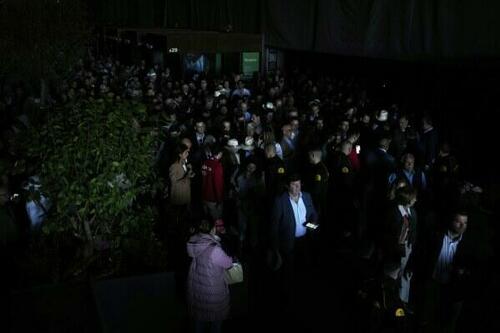
Have You Built Your „Grid” Correctly?
By Michael Every of Rabobank
Delusions of Homo Economicus aside, we each see the world differently via the unconscious cognitive ‘grid’ we all impose on it. Yet in highly unstable times, one needs to check if one’s grid is stable enough to cope.
A week after boasting it had achieved 100% renewables energy power for the first time, Spain’s power grid suffered a crippling blackout, along with Portugal’s. Apparently, this was due to over-reliance on what are always fluctuating power sources vs. the base power that comes from fossil fuels, nuclear, or storage batteries.

Total chaos and a state of emergency ensued: those without cash couldn’t operate – most businesses didn’t; neither did trains, planes, or traffic lights. A never-before tried renewables-based grid black start had restored 3/4 of power at time of writing. The lessons from this shock are: 1) this is what a cyberattack on the West could look like – and we aren’t ready; and 2) as global energy expert @aberman12 makes clear, we can’t rely on renewables power without back-up batteries. Further massive investment is needed; or a return to fossil fuels or nuclear; or we run the risk of black outs from time to time.
Talking of shocks and massive investments, the US says it’s close to giving up on its peace deal for Ukraine: Europe is worried it’s going to walk away, leaving it to carry the defense can. Note recent rumors the UK is unwilling to send troops to Ukraine on concerns that it could lead to direct UK-Russia clashes. The same obviously applies for Europe.
Therefore, the EU and UK will tomorrow announce a strategic partnership aimed at “maintaining global economic stability and our mutual commitment to free and open trade,” along with security cooperation – though whether that means either side will risk a Russia clash absent US cover remains to be seen. Moreover, that’s ahead of a by-election and local elections this week where the Labor government was already going to get hit hard by the anti-EU/pro-US Reform Party – the size of that blow may increase in proportion to the commitment to that new UK-EU deal. Furthermore, how is that new partnership compatible with the UK –who are trying– and Europe –who reportedly aren’t– striking a US trade deal? Do they come as a package now, or not at all?
Equally, the UK is reportedly also close to an FTA with India; yet India is close to a deal with the US that isn’t going to be for “free and open” trade with China. Likewise, Canada’s election –where Trump had called for people to vote for the candidate who would make it the 51st state– looks like seeing acting PM Carney as the one who will have to accept the “No more China” trade terms that Trump will impose, regardless of what he said pre-election.
Expand, or contract, your mental grid to see that “Free trade first” fluctuations aren’t compatible with baseload “security first” realpolitik.
As an example, Pakistan just warned of imminent India military action against it in response to a recent terror attack in Kashmir, to which China stated: “As Pakistan’s ironclad friend and all-weather strategic cooperative partner, China fully understands Pakistan’s legitimate security concerns and supports Pakistan in safeguarding its sovereignty and security interests,” with rumours it and Turkey are sending Pakistan weapons.
India will surely be looking for mirroring statements and actions from those who want more trade with it. The UK and the EU aren’t going to provide them; BRICS is a joke given what C just said about I, via P; and that only leaves the US.
Indeed, the White House is still expecting to bolt on its first new trade deal soon, as noted, likely with India, which could start a domino effect given the scale and potential of those two economies in tandem. At least that’s the plan.
The US will reportedly soften auto tariffs so they don’t stack with steel and aluminium ones, and those on auto parts will be eased. However, it says it’s up to China to de-escalate for a trade deal – which is by necessity and realpolitik more than a trade deal. That’s a message being sent and received on many levels for those who know how to look for the signs aside from those officially recognised by Bloomberg and the Financial Times.
Yet as reports flood in of US supply chains trying to move out of China, Beijing is allegedly blocking other countries’ attempts to buy China-made intermediate goods, and engineering talent, to ensure production of downstream goods stays at home. “Rules-based order”, right?
Meanwhile, a Fed Dallas survey saw firms terrified about looming supply-chain shocks and already asking for rate cuts. They won’t help much, much as markets can’t understand that, again, but that’s what they are asking for if they can’t get tariff relief.
US Senator Paul is quoted by CNN as saying he has the votes to block Trump’s tariffs in the Senate, but the move could be blocked by Speaker Johnson in the House, speaking to the political pressures building, even as there is no election for over 18 months and the prospect of consumer tax cuts ahead: Trump just floated removing income tax on anyone earning less than $200,000.
Of course, that will threaten to blow the US deficit sky high, Liz Truss style: buckle-up, buckaroos. Unless supply shocks are deflationary due to a slump in demand and yields fall: buckle-up, buckaroos.
Again, expand your grid and understand this isn’t just about tariffs, and tariffs aren’t just about trade, and trade isn’t the real game either.
To cap the morning off, the founder of Binance says he thinks the creator of Bitcoin was an AI from the future. Really.
Expand your grid immediately – or risk blackouts.
Tyler Durden
Tue, 04/29/2025 – 09:35
